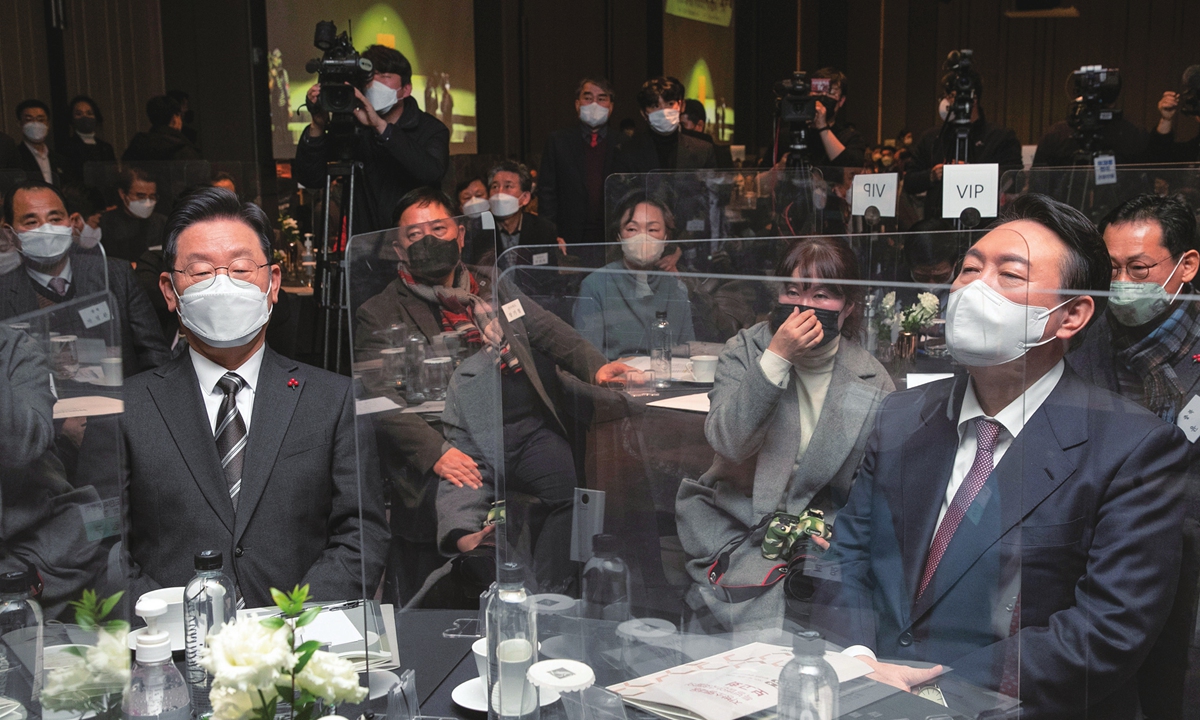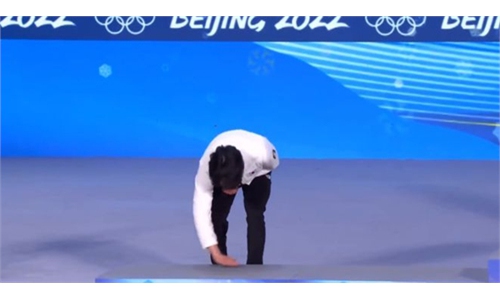Campaign rhetoric in South Korea may not hint future China policy

Lee Jae-myung (left), the presidential candidate of the ruling Democratic Party, and Yoon Suk-yeol, the presidential candidate of the main opposition People Power Party, take part in a meeting at a Seoul hotel, South Korea, December 28, 2021, to discuss a parliamentary bill aimed at boosting balanced regional development. The South Korean presidential election is scheduled to be held on March 9, 2022. Photo: Thepaper
The 2022 South Korean presidential election is scheduled to be held on March 9, the eighth presidential election since democratization. Opinion polls show that Yoon Suk Yeol of the conservative opposition People Power Party (PPP) has a narrow lead over Lee Jae-myung of the governing Democratic Party (DPK), both of whom are leading candidates in this election. It is noticeable that Yoon holds an aggressive attitude in many China-related topics, such as his criticism of President Moon Jae-in's promises of the three "No"s - no additional THAAD deployments, no participation in a US-led global missile shield, and no creation of a trilateral military alliance involving Japan - made in late 2017 after Moon took office.The comments made by Yoon during the campaign have been excessive. However, it is important to note that these statements were made against the backdrop of anti-China sentiment among voters in Korea.
Even Lee, who is considered to have a pro-China stance, vowed earlier to "destroy illegal Chinese fishing boats." As the democratic elections in South Korea are similar to those in the US, politicians will not be held to account by the public for their statements made during the election campaign, nor will these statements be taken as their future policies if they are elected. What's more important than what they say is what they do once in power.
There is a section of the public that believes Yoon's election would lead to a major regression in relations between China and South Korea, especially on issues including the redeployment of THAAD. But it is too early to draw such a conclusion. Putting aside the fact that the plan is highly unfeasible, there is criticism within the PPP of his statements.
South Korea is depending on the US for security while depending on China for its economy. On the economic front, there is a high degree of complementarity between the economies of China and South Korea. China is the top trading partner of South Korea, with the latter's imports accounting for 25.8 percent of its exports. The country will not undermine already formed and improving economic cooperative relations with China, especially after the bilateral free trade agreement was signed.
South Korea's international logistics will soar with the country's connection with the logistics network in Northeast China, and further with the whole of Eurasia through the China-Mongolia-Russia Economic Corridor, China Railway Express, and the New Eurasian Land Bridge. This is greatly tempting for South Korea, and no politician would undermine the future development of bilateral relations in order to implement promises made in their campaign.
In terms of security, the PPP's campaign slogan strategy indicates that it wants to further strengthen the US-South Korea alliance and lean more towards the US in political and diplomatic affairs. Generally, China is concerned that South Korean foreign policy will not undermine the interest of a third party or its relations with China, and most importantly, it will not touch China's red line on the Taiwan question, which could set back bilateral relations. It seems that Yoon may not do such unwise thing which will completely damage China-South Korea relations in a bid to follow the US.
The Moon government has kept the Quad at arm's length in light of its strong anti-China character, saying it has never received a request to join the framework. Its position of "not choosing sides" and not following the US in containing China is fully understood and supported by China, as it is in the interests of both China and South Korea. It is worth noting and observing whether Yoon will break this position if he is elected. But both Yoon and the PPP is aware of the great benefits brought by bilateral cooperation and the disadvantages of joining the US' anti-China club. They will be very prudent in their policy.
In the 30 years since the establishment of diplomatic relations between China and South Korea, no president has been able to undermine the overall foundation of bilateral relations once taking office. Even if the PPP is in power, it will not make major adjustments in the China-South Korea partnership. We should have confidence and expect the relationship, which has entered a relatively mature stage, to continue to move forward.
The author is a professor and director of the Institute of the US and East Asian Studies at Liaoning University.


